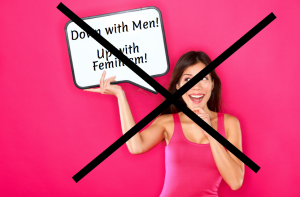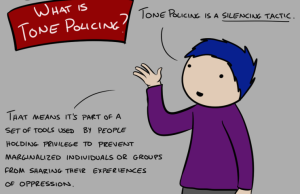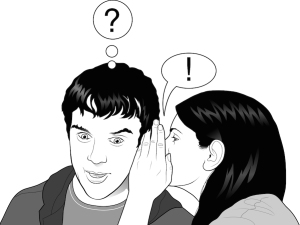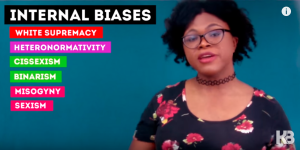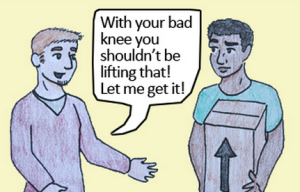(Content Warning: disordered eating, anti-fat stigma, diet culture)
“Body negative” would be a good word to describe my upbringing.
When I was five, my friends and I called one another “fat” as an insult. I started intentionally sucking in my stomach around that age. By twelve, I was creating rules for myself like “you can only eat food other people offer you” so that I would eat less, and by fourteen, I was taking my dad’s calorie-cutting advice – and creating my own increasingly extreme methods.
The following year, when a therapist told me I had an eating disorder, I was baffled. All of this seemed normal to me.
But gradually, over the course of several years of recovery, I found a new normal: body positivity.
Through feminist blogs, eating disorder recovery books, and support groups, I learned that there were concepts of health that didn’t involve weight, concepts of beauty that didn’t involve thinness, and concepts of strength that didn’t involve deprivation.
But despite the movement’s name, what I got out of body positivity wasn’t all positive.
Some of it hindered my recovery, and some of it stemmed from the same cultural ideas that fueled all the body negativity I’d experienced.
Body positivity is not one thing, and the negative aspects of it I’m describing are not universal. In fact, a lot of the problems I’m about to describe are the result of the movement’s co-opting by thin, white, cis, able-bodied, conventionally attractive women – not to mention by advertisers.
At its best, body positivity includes everyone, and I hope to see it head further in that direction. There are a few areas where it could really stand to improve, though.
Here are some negative messages I’ve gotten from people claiming to be body-positive.
1. ‘Love Your Body’
One of the core messages I got from the body-positive movement is that everyone should love their bodies.
What could possibly be wrong with that?
Well, while the message that everyone has the right to love their bodies is good, we’re overstepping our bounds when we tell people how to feel. And women, the group most commonly given this advice, get told how to feel way too often already.
We don’t need to be given yet another thing we have to do, and we also don’t need to be told to be positive even more than we already are. Between telling women to smile and telling them not to be too aggressive, people restrict our emotional expression so much that we end up repressing our feelings to please others.
Instead of telling people to love their bodies, we should let them know they have options, like body neutrality – not having a strong opinion about their looks either way – and (yes) even downright hating their bodies.
In fact, pushing the idea that we should love our bodies can also be discreetly anti-trans: because it discounts the very real experience of body dysphoria.
While struggling with body hatred is painful, it’s also very understandable, and as long as we’re not encouraging others to feel bad about themselves, we should have the right to express how we feel.
I actually find it empowering to feel and voice my body hatred in its fullness without censorship. My body hatred is not vain, and it’s not sad.
It’s an expression of my perceptiveness. It’s my way of processing the messages I’ve gotten from society. It’s my internalization of misogyny, and to block it off is to block off my awareness of the oppression I face.
So don’t tell me to love my body. Tell me to feel what is best for me. I’m an adult; I can make that judgment myself.
2. ‘Real Women Have Curves’
“Real Women Have Curves” has become such a popular supposedly body-positive slogan that it became the name of a movie.
Similar sentiments are reflected all over pop culture. “Fuck the skinny bitches in the club,” Nicki Minaj sings in “Anaconda.” “Boys like a little more booty to hold at night,” Meghan Trainor echoes in “All About That Bass.”
These lyrics aren’t the same as statements that shame fat people, since thin people aren’t generally viewed as inferior because of their bodies, but it’s still not cool to shame anyone based on how they look.
Plus, the concept of a “real woman” is extremely problematic, since it implies that some ways of being a woman are less legitimate than others. And the idea that the most legitimate type of woman has curves privileges cis, conventionally attractive women.
It conflates being a woman with having a female body, and it prizes a particular type of female body.
The women in body-positive advertising campaigns like Dove’s and Lane Bryant’s usually reflect this ideal. They’re not as thin as mainstream models, but they’re not fat, and their weight is concentrated in their breasts and butts, not their stomachs.
This type of body positivity caters to the male gaze. It celebrates women who don’t quite fit the cultural ideal, but are still generally considered pleasant for straight men to look at.
Encouraging body positivity by discussing an ideal body type for women also leaves out people who aren’t women. Men and non-binary people struggle with body image, too.
“Real people come in literally every form” may not be as catchy, but it’s more inclusive.
3. ‘Men Like Something to Hang Onto’
This is often a corollary to “real women have curves,” because this slogan reflects the presumption that real women are women who please men.
I was told by several friends and family members during my restrictive eating disorder that I shouldn’t be losing weight because it makes you less attractive. This really just fuels the idea that it’s women’s duty to be pretty and sexy, which can actually contribute to eating disorder development.
Advising women to gain more weight – either by stopping their diets or recovering from their eating disorders – for men’s sake is just another way of telling women to cater to men. It trivializes negative body image, food issues, and women’s entire existence by implying that the reason they should be healthy, safe, and liberated is so that they’ve got nice tits and ass to ogle at.
Framing women’s body fat as something to “hang on to” also objectifies them by implying that their bodies exist for other people.
More importantly, our body fat is something to keep us warm, regulate our hormones, and perform many other vital functions. Our bodies are first and foremost for us.
This phrase also makes a lot of assumptions, like that all men want to date women, all women want to date men, and men who do date women all like a particular type of woman. And, once again, it’s disproportionately given to women, neglecting all the other genders that have issues with their bodies, food, and fitness.
Obviously, what attracts men is completely irrelevant to a lot of women, and men can be attracted to many different things. Plus, our personalities also matter in attraction, and reducing women’s dating prospects to their looks objectifies them.
Of course it should be okay to have “something to hang on to.” But not because some imaginary homogenous group likes it. Because our mental health is worth prioritizing and our bodies don’t deserve cruel treatment.
It should also be okay not to have much to “hang on to.” In attempting to empower women who aren’t extremely thin, saying “men like something to hang on to” shames those who are.
4. ‘All Women Should Feel Good About Themselves Because All Women Are Beautiful’
People have the right to feel good about themselves, period, whether they’re beautiful or not.
There are many different ways to define beauty, and everyone certainly also has the right to find themselves and anyone else beautiful. But when we say everyone is beautiful, we deny people their right to define themselves.
What would be so bad about someone not being beautiful? That’s not scary unless we believe beauty determines our worth. Not everyone is conventionally attractive, and that’s okay.
Once again, we shouldn’t tell women what to feel. If a woman recognizes that she’s conventionally unattractive and identifies that way, that doesn’t mean she feels bad about herself. We only assume it does because we assume all women define themselves by their looks.
Plenty of male celebrities aren’t conventionally attractive and recognize it, even making self-deprecating jokes, but a woman being unattractive is considered so scary we can’t even mention it.
This isn’t to imply that conventional attractiveness is equivalent to beauty; beauty is completely subjective and can be defined however you want. Anyone can be beautiful, and everyone has the right to their own definition.
But if someone chooses not to view themselves as beautiful, that doesn’t mean they can’t be fulfilled, confident, and badass.
We don’t have the right to feel good about ourselves because of our beauty. We have the right to feel good about ourselves unconditionally.
***
Once again, the impact of body positivity has primarily been good, and we don’t have to throw out the baby with the bathwater. But goddamn, do we have to throw out the bathwater.
Mainstream body positivity as it stands excludes fat people, gender non-conforming people, disabled people, and pretty much any group that doesn’t fit the stereotype of a conventionally attractive woman.
It also further objectifies women by implying that, rather than recognizing that we are not our looks, we should focus on feeling good about our looks – and especially about the impact they can have on straight men.
But this isn’t the only version of body positivity. There are plenty of social media accounts, blogs, podcasts, and other resources that encourage a more inclusive view. And these often come from the people the movement most marginalizes.
I know from my own eating disorder recovery that body positivity needs to take an intersectional feminist approach. If it doesn’t, it’s further oppressing the people who need its help most.
It’s time we embrace a more radical form of body positivity – the kind that doesn’t fit on a billboard.
[do_widget id=”text-101″]
Suzannah Weiss is a Contributing Writer for Everyday Feminism. She is a New York-based writer whose work has appeared in The Washington Post, Salon, Seventeen, Buzzfeed, The Huffington Post, Bustle, and more. She holds degrees in Gender and Sexuality Studies, Modern Culture and Media, and Cognitive Neuroscience from Brown University. You can follow her on Twitter @suzannahweiss. Read her articles here.
Search our 3000+ articles!
Read our articles about:
Our online racial justice training
Used by hundreds of universities, non-profits, and businesses.
Click to learn more












